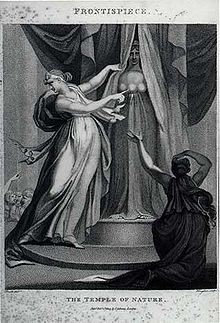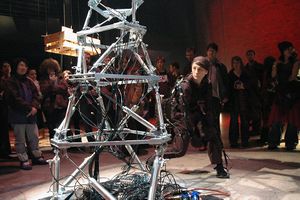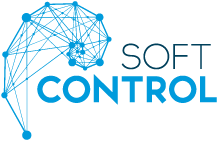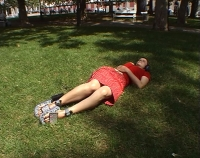About
Soft Control is planned as a multi-annual cultural project aimed at actualising culture phenomena which are emergent when art, science and public awareness are interconnected.
Soft Control (SC) opens scientific labs and theory to artists and different educational entities to a wider audience. Soft Control is a multi-annual cultural performance, an European showcase where artists/cultural workers/others willing to learn what researchers are doing and thinking, and researchers, willing to share and experience creative forms of artistic experimentation and construction, come together in European locations to explore, work, discuss, listen and share ideas and findings. SC entails interacting with and inviting to active participation different target audiences, especially youngsters, students, older people. Culture as a branch and science as a branch can intertwine, constructively sharing cultural models of critical thinking, activism and experimentation with scientific methods, research and knowledge.

Above, the Greek goddess of poetry unveils the goddess of nature
Europe faces major structural challenges – globalisation, climate change and an ageing population. The economic downturn has made these issues even more pressing. The gap between science and society has been shown to still exist, although surveys reveal a very positive and optimistic perception of what science and technology can actually do for humanity in terms of medical research, improvement of life quality, and opportunities for future generations. SC encourages active interest in public issues of science and technology and the complementary: science’s active interest in culture.
There is a high percentage of women working in the cultural sector and there are many children, youngsters, students and elderly people involved in public cultural programs throughout Europe. A better understanding of what is going on in our bodies, environment and society can be achieved by sharing knowledge on how to communicate with different target groups, opening closed scientific circles, displaying complex problems with creativity and simple practical methods.
In Woody Allen’s Sleeper (1973), the protagonists appear as doctors performing human cloning. They fudge a cloning of a dictator, who has been reduced to a lone nose. The question of What is science? is answered “ You know, science is an intellectual dead end.” Is this critical (and humorous) thought necessarily true?

Show case: Sleeper, 1973, reflections on futuristic society and scientific practices
Science and technology is a visible incarnation of our ability to discover and use the laws of nature. A special significance is gained by artistic strategies aimed at shaping a new human right: the right to re-invent and rewrite the very basics of technological myth. This right implies a potential to create new forms and new identities in a fully independent, artistic, creative manner—although not in the capacity of protagonists of a narrative determined by history, but rather as its creators. Such practice goes to show the ability of the artist—and ultimately, of the spectators themselves—to become the authors of their own engineered past, engineering the living future as opposed to a lifeless mechanistic future which is being built without our involvement.

Showcase an art&science&technology work of 21. Century: Bill Vorn
Everyday life has become so intimately interwoven with complex technological ecologies that we can no longer consider technology as the alienating other. The idea that we ‘inhabit’ technological ecologies emphasises our connectedness to our environment (material, natural, technological) and our dependence on the resources available there (material, energetic, biological, cultural). Mastering these conditions is vital to our survival on this planet.
Objectives of Soft Control
- transformation of the public view of art, technology and science from that of closed circles to open fields
- international, regional artists, thinkers, hackers, scientists, philosophers, educators, social scientists, engineers, writers and others as active participants of residencies
- SC aims to have long-term impact on each partner’s local and regional society
- aims to organise workshops and real and improvised laboratories for sharing of specific knowledge and hands-on collaborative creation
- SC emphasises collaboration and network of international artists/scientists/other experts and regional community.
- SC will have a strong focus on education, hands-on creation, collaboration and sharing of knowledge.
- SC partnership’s network (and networking other networks) will support dissemination of ideas, awareness of science as a cultural and society paradigm, stimulating citizens, common people and different target groups to the active participation.
- to strengthen the pan-European collaboration, common production and interdisciplinary approach to art.
- to create art-works ready for touring
- to focus activities in sustainable mobility around media art centres, galleries, residence centres, youth cultural centres, universities, festivals, biennials, institutes, places and initiatives in Europe.
- to embrace the European urban territory (9 partners in 7 countries + additional countries through study visits and collaboration with X-OP association/network)
- to further develop interdisciplinary environment in relation to ICT, science and art creation
- to put a landmark of contemporary interdisciplinary arts and education practices in the ongoing 21st century, which may be also named as a interdisciplinary century
- to encourage intercultural dialogue, active ageing and inter-generational solidarity, cross-culture platforms and mutual collaborative approaches
- to highlight the importance of new technologies for the political and cultural integration of Europe, in particular of the future new EU members (R Croatia, R Serbia)
- to keep the human-social interplay real and direct experience for creation
- to provide open source mapping of production and presentation venues transformation of unipurpose venues into multi-purpose production and presentation spaces revitalization of one brand venues into production facilities;
- to connect, compare and make visible European interdisciplinary art production transcontinental: to Canada, USA, Australia, Singapore, Indonesia, Russia, Manama, Brazil
- to stimulate cultural policy making from bottom up
- integration of private sector and public entities
- collaboration with ECC, Arab (Bahrain 2012, Baghdad 2013) and American Capitals (Sao Paolo 2012) of Culture in a promotion /dissemination sustainability
Activities structure of the project
A range of highly sophisticated art&science&technology works of 21. Century installed and displayed on core exhibitions, festivals, conferences and symposia during the project (venues: Maribor, Slovenj Gradec, Guimaraes, Porto, Rijeka, Riga, Prague, Belgrade, Barcelona). Exchanges, productions, mobility of artists and other experts and circulation of artworks as ongoing process, appearing at large- scale events and dispersed into smaller exhibitions, artists talks and other activities during the project on each partner’s location and connected through networks to other organisations and institutions in Europe and transcontinental locations.
Each co-organiser of SC declared its package of public presentations and involvements. This will result in numerous events, exhibitions, presentations, workshops, performances, lectures, debates, workshops, discussions, social activities etc. Presentations in virtual as well as real space.
SC network map of activities also connect KIBLA’s EU Culture and other projects’ networks, European media-art centres and European Capitals of Culture directly and Arab and American capitals of culture indirectly.
Node: highlights 2012
- symposium/artists talks/space installations by Porto University connected with ECC Guimaraes 2012
- festival KIBLIX (KIBLA) in November – Maribor’s umbrella of a group exhibition, conference, lectures and workshops – a title Technologically Unconscious in a frame of the SC- connected to ECC Maribor 2012 (in this ECC is included Slovenian city Slovenj Gradec as well)
- KGLU, Slovenj Gradec will organise a group exhibition at the same time as KIBLA – a local and regional interconnection (and international as well) to visit, explore and study both exhibitions
- symposium Metamorphosis by CIANT in December
- folio magazine
Node: highlights 2013
- Porto University group exhibition, February
- festival Enter, group exhibition, symposiums – CIANT Prague, April
- festival Limit in Belgrade, November, toward ECC Belgrade 2020
- group exhibition, talks and interventions, MMSU Rijeka, September-December
- folio magazine
Node: highlights 2014
- group exhibition, conference in Riga, RIXC, September-November, connected to the ECC Riga 2014
- group exhibition, artists talks and public interventions, MMSU Rijeka, Februar-April
- folio magazine
Node: highlights 2015
- group exhibition MMSU Rijeka, Februar-April
- Enter Festival Prague, organised by CIANT, April, connected to ECC Plsen 2015
- launching of a representative book
Workshops:
- sustainability and energy efficiency in human life
- low power computing, rechargeable batteries, conversion of local renewable resources
- self-organized open workshops for artists, scientists and others to meet and discuss their interests, open to and involve a wider audience to active participation -focus on new models of production and distribution, e.g. web tv;
- environmental/community development, building sustainable architecture, everyday equipment, permaculture
- open source – open space – open energy
Symposiums:
- bridging artists and scientists, theory and practices
- bridging NGOs, traditional institutions (galleries, museums, foundations), educational bodies, academics and non-academics
- bridging humans past and future cultural paradigms
- start-up initiatives for funding new projects in non-traditional settings
- interdisciplinary models: culture – education, technology – ecology, art – science
- strategies for social engagement, highlighting inclusive rather than confrontational practices
Website: http://www.softcontrol.info/
Press: We share resources for announcement of all events, actions, topics and dissemination of the information and results. We’ll communicate through all channels and media, internet, phone & fax, leaflets, invitations, posters, booklets, catalogues, press conferences, press releases, special communiqués such as web tv.
Publications: A theoretical book, three magazines (Folio) on annual basis and partners booklets series covering: SC contents/texts and illustrations of SC concepts partners’ profiles artists and scientists profiles Registration for Creative-Commons will be discussed.
Research/residencies/workshops models: educational program involves emerging artists in professional / advanced workshops and exhibiting output, reaching out to the public and youth with lectures, artists talks, discussions and various workshops on creative and playful technology&art projects – activities as alternative means of self-education. Focuses: establishing a net of laboratories at the universities, independent institutions etc finding ready made places adopted to working conditions for research and production inventing open source mobile public interventions and installations building small urban permaculture gardens for a sustainable future mobility and exchange coordinated by an experts’ and partners’ consortium developing models for a non-formal education connected to formal educational bodies residencies for focused artistic research using scientific models, methods and knowledge
Study visits in distinguished European and trans-European art festivals – a must – tasked to update knowledge in a specific field, do presentations, contact artists, experts and others, to firm previous networks, upgrade present networks and establish new ones: to disseminate and collaborate; each partner preselected study visits according to the interest and a budget. Ars Electronica in Linz (2013) Festival Transmediale in Berlin (2014) Kinetica in London- to exhibit a selected artwork from the SC container (2015) Venice Biennial (2013) Smart City, Paris (2014), art-science-technology works integrated in urban space Netherlands Media Art Institute (2013), an educational digital entity Production School Hvidovre at Copenhagen, Denmark (2013), a school for socially problematic teenagers – an excellent educational model of integration of a specific social group into art production – show case for other E regions
Partnership of Soft Control
Slovenian coordinator KIBLA builds and shares the concept of SC, coordinating a consortium of partners. Kibla positions art in interdisciplinary fields, combining science and technology, connecting artistic research with university labs, connecting universities with ECCs, using existing networks (X-OP & other EU projects), building new ones. Conceptually and actively connecting promotional channels of SC with ECC (Maribor/Slovenj Gradec 2012, Guimaraes 2012 through University of Porto, Riga 2014 through Rixc, Plzen 2015 through CIANT and ECC Belgrade 2020 through 03ONE and Dom omladine Beograd). Organising exhibitions, artists talks, symposia, discussions and educational program of SC, dispersing artworks and artists to the partners places and also to other cities and similar organisations in Europe. Builds open public platforms and a wider audience to the cultural field. KIBLA will integrate new “virgin” partners into EU projects (KGLU, O3ONE, Dom omladine Belgrade) – to implement according to SC timetable all obligations, research and professional development activities undertaken by all co-organizers and artists. It will work on the marketing, promotion and dissemination strategy, and finding and fostering links with other European projects, networks and consortia. Chiefly responsible for quality of all outputs.
Portuguese partner Faculty of Fine Arts, University of Porto will network and foster the exchange between European art education institutions – for SC – in terms of artists, experts, scientists, students and teaching staff mobility. It will host 14 artists in residencies in Porto (the highest number of residencies in the project SC). It will organize exhibitions, artists talks, symposium in Guimaraes and other events in Porto. The good relationship between the Faculty of Fine Arts and art galleries in Porto also ensures a dissemination of SC output, ideas, art-works. It will encourage and develop fundamental and applied research. It will support and implement SC cultural extension activities. It will encourage the cultural, scientific and technical exchange with SC partners consortium. High numbers of workshops (14) resulting in exhibitions are an important part of the SC activities as well.
RIXC, Riga will develop a discussion between artists, theorists, designers, environmental scientists, technologists, responsible entrepreneurs and activists. Diversity, social and ecological sustainability and a much deeper understanding of technology will build a content perspective of the SC. RIXC will organising of public events (exhibitions, workshops, performances, etc.), will co-product video, audio and web, will build specific target groups, educational and social programmes and research into the fields suitable for SC. It will share NICE network (Nordic-Baltic-North-East European network) and other international and cross disciplinary networks, co-projects and mailing-lists in Europe, Canada…
CIANT has supported the application with conceptual inputs making the potential impact of the SC and network better suited to needs of local audiences in Central-European countries: Czech and Slovak Republics. It will contribute to the development of curatorial strategies and will support dissemination processes and will host SC in Prague three times: a symposium, and twice the Enter biennial festival with exhibitions and workshops. It will contribute to the overall visibility of the project through concrete media outputs and ensure that local audiences learn about all events, especially those implemented in Prague. It will carry out research and production activities making significant contribution to the knowledge exchanges with SC network. CIANT hopes to bring together cultural creative communities in the Czech Republic for a lasting collaboration.
FundaciĂł Privada AssociaciĂł d’ Artistes Visuals de Catalunya will offer residencies to art researchers to work within SC areas, working in collaboration with long-term users of SC. It will offer workspaces, accommodation and stipends which will be used by artists in residences. There will be three 1-month residencies. Resident artists will present publicly their results – they’ill open studios and do workshops. Events (exhibitions, performances, artists talks, discussions and symposia…) will be organised. FundaciĂł offers open-source software to enable shared archive systems between partners in the consortium SC.
MMSU Rijeka will develop the idea of interconnectivity between art and science; through SC, MMSU will gather artists and researchers who radically analyse the notion of public monuments, their past and contemporary formations as well as their relations to power, knowledge and representational systems. During three years the contents will be exposed through events; exhibitions, artists talks, discussions, symposia, workshops etc. MMSU will provide public interventions and exhibitions dealing with extended platform of Quadrilateral Biennial. The consortium brings applicants for residencies, art productions and collaborations.
KGLU Slovenj Gradec will offer its up-to-date renovated gallery space of 900 m2 ideal for contemporary art-science-technological exhibitions, especially in a frame of 2012 exhibition, where a big group exhibition of global artists (Europe, USA, Canada, Singapore, Indonesia) will take place. Professional organisational know-how, PR and contents-providing will be offered through the whole project. KGLU’s connections and networks with Austria are of an extreme importance, especially with Graz (ECC 2003). KGLU has a well organised audience’ structure and networking channels to Balkan. KGLU has a high national and regional importance in Slovenia.
Dom omladine Beograd (DOB)/Cultural centre of the City of Belgrade will promote SC contents through DOB’s youth programs in the fields of contemporary art and culture. Educative and debate programs have for decades been DOB’s trademark, so it will provide lectures, workshops and symposium. DOB will provide an ideal know-how platform for organising exhibitions, screenings, artists talks and others. DOB organises the annual festival LIMIT, which will be thematically dedicated to the Soft Control in 2013. DOB will promote new artists, ideas and initiatives, being also a platform for connecting institutional and non-institutional culture. DOB will provide local and regional target audiences. DOB will share numerous local, regional and international networks.
O3ONE is an exclusive Belgrade private gallery providing connections with a scene of intellectuals, artists, experts etc. and will offer to the SC an environment with target audiences, local networking – for a symposium of the SC. It will share ideas on the field of web production, and a graphic design as well.
Quality of partnership will be achieved through coordinated research, production, presentation and dissemination. The implementation will involve a balance between research and production, with periodic public events during various stages of the project. Public events will be designed for different cultures, local contexts and presentation formats encouraging artworks circulations. All partners will research contemporary art/science/ICT production in their country and will be involved in public events. All partners will share a knowledge base and skill-sets in the process. All partners will be responsible for professional development activities. All partners will collaborate on designing and developing artworks and technologies for public events, situations, creations, disseminating acquired knowledge through public presentations. Partners will encourage access to project creations youngsters, elderly people and socially disadvantaged groups with no or low access to new and emerging art-forms.
All organisations will be involved in documentation of the project. Folio magazine and a book – materials collected, edited and designed by Kibla. The whole SC network will also work closely with a number of organizations and institutions throughout Europe to evaluate outcome of the program. Continual documentation and evaluation of the processes, events and results will be available online.

